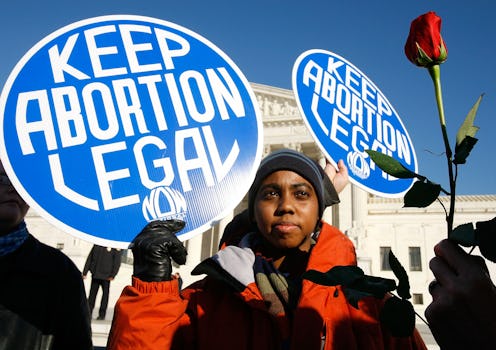
Abortion rights advocates are upfront about the fact that they believe there are currently very real, tangible threats to Roe v. Wade, especially given the Supreme Court's conservative majority. With this in mind, some organizations say they are spending more time advocating for state-level abortion laws in order to protect access in as many places as possible, should the landmark ruling one day be overturned.
"The truth is, it begins and ends in the state. Even our best [rulings], like Roe v. Wade, came from a challenge to a restrictive Texas law that criminalized abortion," Andrea Miller, president of the National Institute for Reproductive Health (NIRH) and the NIRH Action Fund, tells Bustle. "The reality is that states have long been the arbiters of whether or not women are able to access reproductive health care, and whether their rights are going to be protected."
Just last month, New York expanded its own laws to catch up with the protections provided under the 1973 Roe ruling. Democratic Gov. Andrew Cuomo said in a statement released days beforehand that it was "critical that we codify the Roe v. Wade decision into state law," and added that he hopes to enshrine abortion access in the state's constitution next.
While New York received tremendous attention from abortion rights advocates and abortion opponents alike, it's far from the only state taking up such measures.
Abortion Rights Battlegrounds Aren't Always Where You'd Expect
Efforts to protect abortion access at the state level include not only codifying Roe, but also expanding access where possible. Reproductive rights organizations are promoting these changes in all 50 states. And notably, waging the abortion access battle at the state level is precisely the method that abortion opponents have been using for quite some time, as Olga Khazan has reported at The Atlantic.
This approach is not entirely new for some advocates. Destiny Lopez, co-director of All* Above All, tells Bustle in an email that women of color — who are disproportionately impacted by abortion rights restrictions — have been organizing in their states for years, describing them as "the foundation of the resistance." And Miller explains that the NIRH, which has long worked at the state level, models its local initiatives based on what individual states need, from financial assistance to policy-writing support and communications strategy.
The pivot across reproductive rights organizations to state-focused policy changes does appear to be a recently concerted effort, though. NARAL, for example, launched "Reality of Roe," an initiative to bring attention to how changes and protections can be implemented on a state level. NARAL President Ilyse Hogue says in a press release about the program that state legislatures' moves to protect abortion rights will "impact lives in those states, send a message to lawmakers across the country, and pave the way for other states to follow suit."
The strategy has seen success in places like New York and Massachusetts, which recently repealed pre-Roe legislation that banned abortion (the ban had remained on the books even though it wasn't enforced). There is now a push in New Mexico to repeal a similarly outdated law, and Rhode Island legislators are trying to codify Roe as well. Miller says she expects to see similar action in places like Connecticut, Delaware, and New Jersey.
Lopez also points to Oregon and Illinois, which she says "have taken bold action by passing legislation that ensures insurance coverage for abortion for women in their states." In addition, she highlights municipalities, including St. Louis, Missouri, that have "passed resolutions declaring their support for abortion coverage."
The fight to protect abortion access is also taking place in states where Republican-controlled legislatures have enacted, or tried to enact, restrictive laws. Miller points to "Rosie's Law" in Texas, which would allow Medicaid recipients to receive abortion care, as well as Wisconsin's Respect Women Act, which would, among other things, repeal certain abortion restrictions that its proponents say have no medical justifications. She also expresses optimism about pockets of the nation that have a reputation for being anti-abortion, but where progressive politicians continue to push abortion rights legislation.
"In hostile states, we can mitigate harm by repealing harmful laws, and build support where it’s possible," she says.
How The Midterm Results Pushed These Efforts Into Overdrive
Reproductive rights advocates tell Bustle that their organizations have been waging state-level battles to protect abortion access for years. That strategy began to pick up steam around the time of the 2016 presidential election, however, and ramped up even more after November's midterms, according to Planned Parenthood. At that point, Democrats — who are by and large in favor of abortion rights — took control of the U.S. House. Advocates took the results as proof that voters embrace politicians who openly, vocally support legislation protecting and expanding abortion access.
Voters "want more access to health care, not less, and they elected reproductive health champions to the House of Representatives, and to state legislatures and Governors mansions across the country," Dr. Leana Wen, President of Planned Parenthood Federation of America, tells Bustle.
Abortion rights advocates consistently and repeatedly point to November's midterms as a quantitative measure for how voters feel about abortion access. Amanda Thayer, NARAL's Deputy National Communications Director, tells Bustle that "new opportunities exist now thanks to pro-choice gains in state legislatures and governors' mansions in the 2018 elections."
"In the midterms, we saw so many candidates run and win — and voters support — an affirmative agenda that advances abortion rights and access," Miller adds. "And so we are excited to see that now, as the legislatures are gearing up."